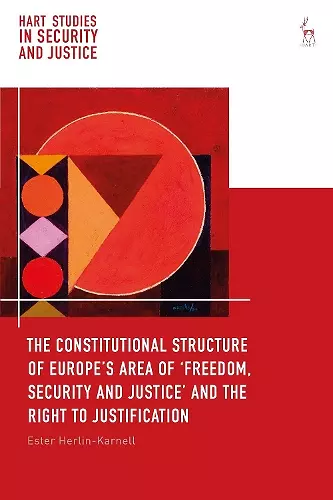The Constitutional Structure of Europe’s Area of ‘Freedom, Security and Justice’ and the Right to Justification
Format:Hardback
Publisher:Bloomsbury Publishing PLC
Published:18th Apr '19
Currently unavailable, and unfortunately no date known when it will be back

Original research on the constitutional structure of Europe's Area of Security, Freedom and Justice, an increasingly topical and important area of constitutional and EU law, publishing in Hart's new series, Hart Studies in Security and Justice.
This book explores the implications of freedom as a non-domination-oriented view for understanding EU security regulation and its constitutional implications. At a time when the European borders are under pressure and with the refugee and migration crisis, which escalated in 2015, the idea of exploring a constitutional theory for the ‘Area of Freedom, Security and Justice’ (AFSJ) might seem to be a utopian project. This appears especially true in the light of the increased threat of terrorism in Europe (and on a global scale) and where the expanding EU security agenda is often advanced through the administrative law path, in contrast to the constitutional trajectory. Add to this the prolonged financial crisis, which continues to cast a long shadow on the future development of EU integration, and which suggests that Europe needs to ‘re-invent itself’ beyond the sphere of economics. Therefore, it is precisely because of the current uncertainties regarding the progress of the EU and the constitutional law project that a constitutional take on the AFSJ is of particular importance. The book investigates the meaning of non-domination and the idea of justice and justification in the area of EU security regulation. In doing so, it focuses on the development of an AFSJ, what it means, and why it represents a fascinating example of contemporary constitutional law with interacting layers of security regulation, human rights law and transnational legal theory at its core.
The analysis presented in the book provides more classic discussion points around the AFSJ with robust philosophical foundations. The conceptual richness of the volume sparks a number of follow-up questions that will be hopefully investigated in the future. This piece of scholarship fills a gap in the existing literature by offering a more systemic understanding of the functioning of the AFSJ, and offers an original angle to assess long-standing questions of constitutional relevance. -- Leandro Mancano * Common Market Law Review *
Herlin-Karnell brings a different perspective to the table and points to the big picture, with well-articulated and compelling arguments that seek to advance the debate in the field of EU criminal law. -- Konstantinos Zoumpoulakis, Leiden Law School * New Journal of European Criminal Law *
It is interesting how Herlin-Karnell connects the topics of non-domination theory, the right to justification and the proportionality principle. This is an added value indeed … the very many questions discussed, the thorough analysis of scholarship and case-law offer a very decent basis for further investigations in European criminal law. -- Attila Vincze, Andrassy University Budapest * Vienna Journal on International Constitutional Law *
ISBN: 9781509912490
Dimensions: unknown
Weight: 442g
200 pages